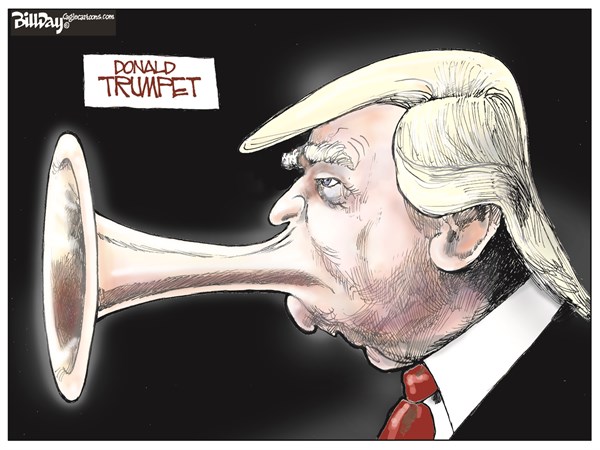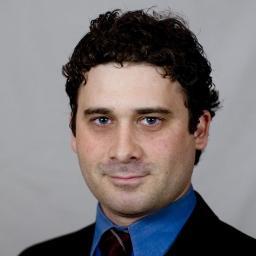
The whole world is struggling to decipher the worldview and guiding principles Donald Trump would apply as president. It may not be a prominent feature of his campaign, but his advisers say he does have a doctrine that informs his positions on foreign policy and national security.
Some leading foreign policy pundits are convinced Trump is shooting from the hip on foreign policy, making up glib answers to serious questions like how to defeat the Islamic State or deal with an aggressive Vladimir Putin. Top Republican national security officials who advise other candidates routinely tell reporters they have not heard from the Trump campaign, which leads them to believe he has not sought any expert input before his provocative statements, like lashing out against China or Saudi Arabia.
Trump's advisers say they're happy to be perplexing. The Washington foreign policy establishment has no idea what to make of Trump's string of declarations, such as his promises to "take" the Islamic State's oil, force Mexico to pay for a wall on the southern U.S. border, or bar all Muslims from coming to the U.S.
"This whole notion that he is devoid of advisers is wrong. We have a lot of smart guys around us and a lot of smart people helping us," Sam Clovis, Trump's chief policy adviser, told me in an interview. "There's a lot more to this than what our opponents and the pundits think. We play them like a five-string banjo because at the end of the day, they are going to look stupid. We don't mind doing that."
Clovis, a retired Air Force colonel and former Iowa Senate candidate, leads a policy team of two that works with campaign manager Corey Lewandowski to connect Trump to experts and former officials constantly, he said.
Following a couple of incidents in which Trump identified his foreign policy consultant -- only then to have that person deny it -- the campaign is mum on names. But other experts have regular interactions with Trump, including former Defense Intelligence Agency head Gen. Michael Flynn. Flynn, who has also met with other Republican presidential candidates, told me that Trump was a "superb listener" who asked "exceptional questions" and was interested in detail on a wide range of world issues.
"This guy is really switched on and has a strong understanding of what's going on in the world," said Flynn. "I walked away with a much stronger impression of him than I had previously."
Sources close to the campaign told me Trump has also spoken with controversial historian Daniel Pipes and Israel's current envoy to the UN Danny Danon, among others.
Sources close to the campaign tell me that Trump's foreign policy proclamations are not ad hoc; in fact most are planned months in advance. For example, on Dec. 7 when Trump announced his idea to ban Muslims, it appeared to be a response to the terror attack in San Bernardino only days earlier. Sources close to the campaign say it had planned to announce the policy well before that attack happened.
Clovis said there was a huge amount of preparation that preceded Trump's call for a pause in Muslim immigration.
"Do you think for a minute we would send the leading presidential candidate out, if we did not have the law, the history, and the Constitution on our side? Think it through," he said. "We know exactly what we want to do and when."
Trump's advisers also claim that Trump's wide-ranging foreign policy proposals, which include renegotiating the U.S.- Japan alliance treaty and outsourcing the Syria problem to the Russians, all fit into an easily understandable set of three "organizing principles" that form Trump's governing doctrine on foreign policy.
"One, we want to take a very clear worldview in our foreign policy, dealing with the national interest, and let that be our organizing principles. Two is that we want to make sure that we engage in free markets, but we want those markets to be fairer as well. And three, if we do not have strong economic recovery, we can't do the other two," said Clovis. "If that's not a Trump doctrine, I don't know what is."
The practical application of that doctrine plays out in several ways. Trump's narrow definition of "national interest" does not include things like democracy promotion, humanitarian intervention, the responsibility to protect people from atrocities or the advocacy of human rights abroad. Trump believes that economic engagement will lead to political opening in the long run. He doesn't think the U.S. government should spend blood or treasure on trying to change other countries' systems.
"This is a long game; it's not a short game," Clovis said. He faulted neoconservatives who " think you can go out there and in three weeks after Iraq collapses you can create a constitutional democracy over there."
The Trump campaign thinks of this approach as pragmatic and realistic. Like classical realists, Trump wants to deal with states and governments, not non-state actors or international organizations. That, according to his advisers, is why he sometimes seems to praise strongmen who lead their states as executives with absolute power. Trump sees Putin and other dictators as businessmen doing what any CEO would do, fighting for their organization.
"Mr. Trump looks at them and he says, 'OK, I know exactly what kind of man you are and I know when I sit down at the table with you I can get your measure,' " said Clovis. "That's really the calculus that's in place."
Clovis said the problem in the Republican national security establishment is that the experts see everything in "micro- tactical" terms and want to solve problems immediately rather than taking a longer historical view. He said Trump's narrower vision of America's national interest is designed for the everyman.
"People get it," Clovis said. "And you know what, he's absolutely right."
Sam Nunberg, who advised Trump on foreign policy early in the campaign before having a falling out with Lewandowski, told me that Trump's foreign policy was "Reagan-esque realpolitik," a stance designed to be able to make policies based on circumstances without being burdened by ideology.
"Reagan would go after [Libyan leader Moammar] Gadhafi, but he would do business with Saddam," he said. "It's a case-by-case basis of what's in American interests."
Trump's foreign policy doctrine may be undecipherable from his public statements, and once articulated by his advisers it may be somewhat unsatisfying to experts. But it does exist. And it shows that as president, he would alter America's global role in major way.
Comment by clicking here.
Josh Rogin, a Bloomberg View columnist, writes about national security and foreign affairs. He has previously worked for the Daily Beast, Newsweek, Foreign Policy magazine, the Washington Post, Congressional Quarterly and Asahi Shimbun.
Previously:
• 01/27/16: Bergdahl defense could call his loudest foe, Trump
• 01/07/16: Why when North Korea forces Obama's Washinton to pay attention all the U.S. government can do is grieve
• 01/06/16: Obama's Mideast balancing act tilts to Iran
• 12/28/15: Assad is reaching out to Washington power brokers
• 12/23/15: U.S. quietly negotiating to free Americans in Syria
• 12/21/15: Russian arms in Syria keep U.S. grounded
• 11/17/15: Assad's Paris win
• 11/12/15: The Pentagon's lonely war against Russia and China
• 11/05/15: Iran, Saudi Arabia clash inside Syria talks
• 10/28/15: U.S. is driving Mideast allies to Putin
• 10/26/15: Source of Hillary's Libya data a mystery
• 10/21/15: Team Jeb calls out Trump for trashing Freedom Tower
• 09/23/15: Xi visit marks downturn in US-China relations
• 08/31/15: Walker stakes his territory on foreign policy
• 06/08/15: Hillary just lost one of her only selling points
• 03/02/15: An Obama deal with Iran could die with his days in office
• 02/23/15: Shock, awe and Jeb Bush's foreign policy dream team
• 01/22/15: At GOP pow-wow 2016 front-runners pledge, lay out vision to restore America's world leadership role


 Contact The Editor
Contact The Editor
 Articles By This Author
Articles By This Author
